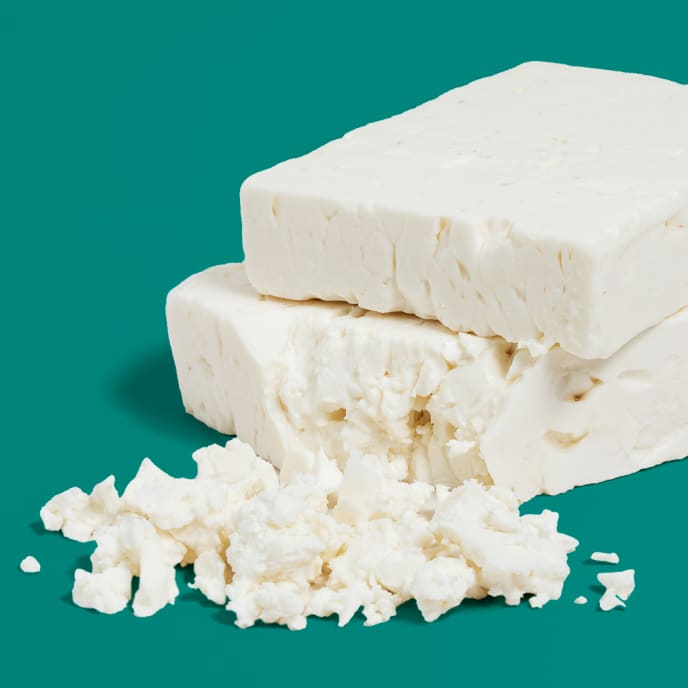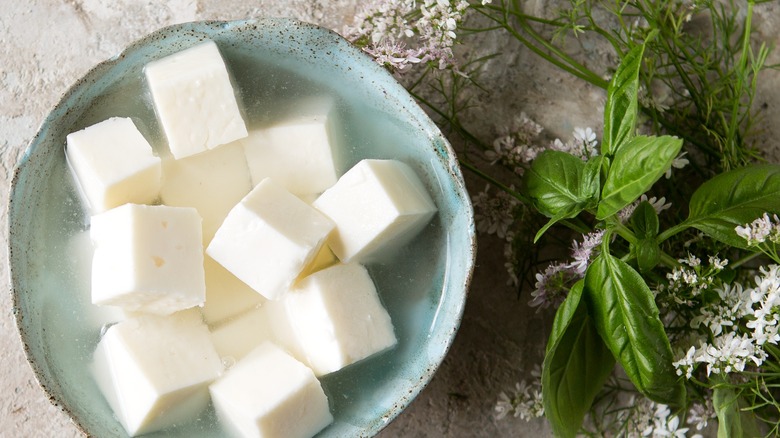Feta cheese is a delicious and versatile dairy product. But how long does it last in brine?
Generally, feta can last up to three months if stored properly. Feta is a staple in many kitchens, known for its tangy flavor and crumbly texture. When stored in brine, it can stay fresh longer than other cheeses. The saltwater solution helps preserve its quality and taste.
Understanding the shelf life of feta in brine can help you make the most of this tasty cheese. Proper storage is key to ensuring it stays fresh and safe to eat. In this blog post, we will explore the factors that affect feta’s longevity in brine and offer tips for keeping it fresh.
Introduction To Feta In Brine
Feta cheese is a beloved dairy product enjoyed worldwide. It’s known for its crumbly texture and salty flavor. When submerged in brine, it lasts longer. But how long does feta last in brine? Let’s explore!
What Is Feta Cheese?
Feta cheese is a traditional Greek cheese made from sheep’s milk or a mixture of sheep and goat’s milk. It has a tangy and salty taste. Feta is often used in salads, pastries, and various Mediterranean dishes.
Why Use Brine For Preservation?
Brine is a saltwater solution that helps preserve feta cheese. Immersing feta in brine prevents it from drying out and extends its shelf life. This method maintains the cheese’s moisture and flavor.
| Benefits of Brine | Description |
|---|---|
| Prevents Drying | Keeps cheese moist and fresh |
| Enhances Flavor | Maintains the tangy taste of feta |
| Extends Shelf Life | Feta lasts longer in brine |
Below are some key points to remember about feta in brine:
- Feta in brine can last for several months.
- Always keep the cheese submerged in brine.
- Use a clean container to store feta in brine.
- Check the brine level regularly.
- Keep the container sealed.
- Store in the refrigerator for best results.

Credit: www.reddit.com
Shelf Life Of Feta In Brine
Feta cheese, stored in brine, can last surprisingly long. Knowing its shelf life helps you enjoy it at its best. Let’s dive into how long feta can last in brine.
Typical Duration
In general, feta cheese in brine can last up to 3 months. The brine helps preserve the cheese, maintaining its flavor and texture. Refrigeration is essential for extending its longevity.
Factors Affecting Longevity
Several factors can impact how long feta lasts in brine:
- Storage Temperature: Keep feta at a stable, cold temperature.
- Brine Quality: Fresh and well-maintained brine extends shelf life.
- Cheese Quality: High-quality feta lasts longer in brine.
- Container Seal: An airtight seal preserves freshness.
| Factor | Impact |
|---|---|
| Storage Temperature | Cold temperatures slow down spoilage. |
| Brine Quality | Fresh brine prevents bacterial growth. |
| Cheese Quality | Higher quality cheese has better longevity. |
| Container Seal | Airtight seals keep out contaminants. |
Regularly check your feta for any signs of spoilage. If the feta looks or smells off, it’s best to discard it.
Storing Feta Properly
Proper storage of feta cheese can greatly extend its shelf life. Feta in brine can last longer with the right techniques. Let’s explore the best ways to store your feta cheese.
Optimal Container Types
Selecting the right container is crucial for feta storage. The best options include:
- Glass Jars: They are non-reactive and seal well. Ideal for maintaining feta’s taste and texture.
- Plastic Containers: Ensure they are food-grade. Make sure the lid is tight to prevent air exposure.
- Ceramic Containers: These are another excellent choice. They keep feta cool and fresh.
Avoid metal containers as they can react with the brine. This affects the flavor of the cheese.
Ideal Storage Temperature
Storing feta at the right temperature is key. The recommended temperature range is:
| Temperature | Description |
|---|---|
| 34-38°F (1-3°C) | Best for long-term storage. Keeps feta fresh and flavorful. |
| Above 40°F (4°C) | Not recommended. Feta may spoil quickly. |
Keep your refrigerator at a consistent temperature. This will ensure your feta cheese remains in optimal condition.
Signs Of Spoiled Feta
Feta cheese in brine can last a long time, but it eventually spoils. It’s important to know the signs of spoiled feta to avoid eating bad cheese. Here are some indicators to help you identify if your feta has gone bad.
Visual Indicators
One of the first things to check is the appearance of the feta. Fresh feta should be white and moist. If you see any of the following signs, your feta may be spoiled:
- Mold: Any green or black spots indicate mold. Do not eat it.
- Discoloration: Yellow or brown spots are bad signs.
- Dryness: If the cheese looks very dry, it may be old.
Smell And Taste Changes
Feta cheese has a distinct smell. If the scent changes, it may be spoiled. Pay attention to these changes:
- Sour Smell: A sour smell is a clear sign of spoilage.
- Off Odor: Any unpleasant or unusual odor is bad.
Taste is another important indicator. Fresh feta tastes tangy and salty. If the taste changes, consider it spoiled:
- Bitterness: A bitter taste is a sign of spoilage.
- Sour Taste: A sour taste means the cheese has gone bad.
Extending Feta’s Shelf Life
Feta cheese stored in brine can last for weeks. But how can we make it last even longer? By following some simple steps, you can extend the shelf life of your feta cheese. Here are some tips that can help you keep your feta fresh for as long as possible.
Changing The Brine
Changing the brine regularly can help extend the life of feta cheese. Fresh brine prevents bacteria growth. To make a new brine:
- Dissolve 1 tablespoon of salt in 1 cup of water.
- Pour the new brine over the feta in a clean container.
- Ensure the feta is fully submerged.
Repeat this process every 1-2 weeks. This simple step will help keep your feta cheese fresh for longer periods.
Freezing Feta
Another effective method to extend feta’s shelf life is freezing it. While freezing may change its texture, it will keep the cheese safe to eat for months.
- Cut feta into smaller pieces or crumbles.
- Wrap each piece tightly in plastic wrap.
- Place the wrapped pieces in a freezer bag.
- Label the bag with the date.
- Store in the freezer for up to 6 months.
To use frozen feta, thaw it in the refrigerator overnight. Frozen feta works well in cooked dishes.
By changing the brine and freezing feta, you can enjoy your favorite cheese longer. Remember these tips next time you buy feta cheese.
Common Mistakes To Avoid
Storing feta in brine is a common practice to keep it fresh and flavorful. Yet, many people make mistakes that can reduce its shelf life. Here are some common mistakes to avoid when storing feta in brine.
Improper Sealing
Proper sealing is crucial for maintaining the freshness of feta in brine. If the container is not sealed tightly, air can enter and spoil the cheese. Always use airtight containers to store feta in brine. Make sure the lid is secure. A loose lid can lead to contamination and reduced shelf life.
Incorrect Temperature
Temperature plays a vital role in preserving feta in brine. Storing it at the wrong temperature can cause spoilage. Always keep feta in the fridge. The ideal temperature is between 34-40°F (1-4°C). Avoid keeping it in the fridge door, where temperatures fluctuate. Instead, place it on a middle shelf.
Using Preserved Feta
Preserved feta in brine can add a rich, tangy flavor to many dishes. This cheese is versatile and can be used in various recipes and serving ideas. Here are some creative ways to use feta that’s been stored in brine.
Recipe Ideas
Feta in brine can be a star ingredient in many recipes. Here are a few ideas:
- Greek Salad: Combine feta with tomatoes, cucumbers, olives, and red onions.
- Spanakopita: Mix feta with spinach and fill in phyllo dough for a savory pie.
- Stuffed Peppers: Fill bell peppers with a mixture of feta, quinoa, and herbs.
- Pasta Dishes: Crumble feta over pasta with fresh basil and cherry tomatoes.
Serving Suggestions
Feta in brine also shines in simple serving ideas. Here are a few suggestions:
- Appetizer Platter: Serve feta with olives, pita bread, and hummus.
- Breakfast: Add feta to scrambled eggs or an omelet.
- Snack: Pair feta with crackers and fresh fruit like grapes or figs.
- Grilled: Grill feta and serve with a drizzle of olive oil and herbs.
Preserved feta in brine remains fresh and flavorful for an extended period. Use these ideas to enjoy its unique taste in various dishes.

Credit: www.americastestkitchen.com
Health Benefits Of Feta
Feta cheese, a staple in Mediterranean cuisine, is not just delicious. It also offers several health benefits. Rich in essential nutrients, feta can be a valuable addition to a balanced diet.
Nutritional Value
Feta cheese is packed with nutrients that are beneficial for your body. Here’s a quick look at its nutritional profile:
| Nutrient | Amount per 100g |
|---|---|
| Calories | 264 kcal |
| Protein | 14.2g |
| Fat | 21.3g |
| Calcium | 493 mg |
| Sodium | 917 mg |
Feta is a good source of protein, essential for muscle repair. It also contains calcium, important for bone health.
Potential Health Benefits
Eating feta cheese can provide several health benefits:
- Bone Health: The high calcium content supports strong bones.
- Digestive Health: Feta contains probiotics, aiding in digestion.
- Weight Management: The protein helps you feel full longer.
- Heart Health: Feta has lower fat content compared to other cheeses.
Including feta in your diet can help you stay healthy and fit. Its rich nutritional value contributes to overall well-being.

Credit: www.americastestkitchen.com
Frequently Asked Questions
How Long Does Feta Last In Brine?
Feta can last up to 1 month in brine when refrigerated. Ensure it is fully submerged in the brine solution.
How To Store Feta In Brine?
Store feta in a sealed container with brine. Keep it refrigerated to maintain freshness and prevent spoilage.
Does Feta In Brine Go Bad?
Yes, feta in brine can go bad. It lasts up to a month in proper storage conditions.
Can You Freeze Feta In Brine?
Freezing feta in brine is not recommended. It can alter the texture and flavor of the cheese.
Conclusion
Feta cheese in brine lasts longer than without. Proper storage is key. Keep it in the fridge, submerged in brine. Always use clean utensils. If it smells off, discard it. Fresh feta tastes best. Enjoy it in salads or on bread.
Storing feta well keeps it fresh and tasty. Happy eating!




